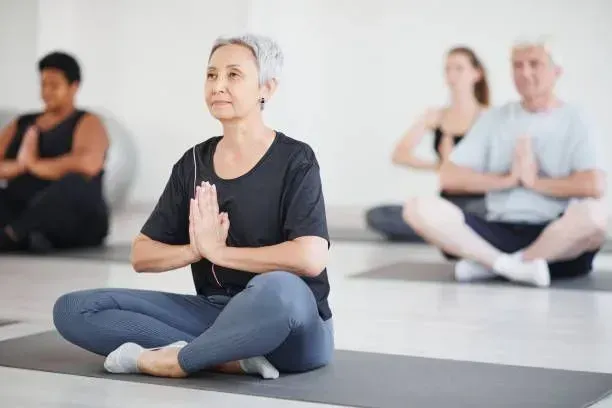Caregiver Exercises to Relieve Stress
Caregiver Exercises to Relieve Stress
Caregiver exercises to relieve stress are essential for maintaining the physical and emotional well-being of those who provide care for others. The demands of caregiving can lead to significant stress, fatigue, and burnout, which can negatively impact both the caregiver's health and the quality of care they provide. Regular physical activity, such as yoga, walking, or strength training, can help caregivers manage stress by releasing endorphins, improving sleep, and increasing energy levels. Additionally, exercises that incorporate mindfulness, like tai chi or meditation, can enhance mental clarity, reduce anxiety, and promote a sense of calm. Engaging in these activities not only helps caregivers stay physically fit but also provides crucial time for self-care, allowing them to recharge and maintain a positive outlook. Prioritizing exercise and stress-relief techniques is vital for caregivers to sustain their own health and continue delivering compassionate, effective care to their loved ones.

Are You a Caregiver Searching for Exercises to Relieve Stress?
Being a caregiver can be an immensely rewarding role, but it also comes with its fair share of challenges and stress. Caregivers dedicate their time and energy to supporting others, often neglecting their own well-being in the process. It's crucial for caregivers to prioritize self-care and find effective ways to manage stress. Engaging in regular exercises tailored to alleviate stress can significantly improve the physical and mental well-being of caregivers. In this article, we will explore various caregiver exercises to relieve stress, backed by credible sources, as provided by 7 Day Home Care, a trusted home care provider serving Manhattan, Brooklyn, Queens, Nassau County, and Suffolk County.
Yoga and Meditation for Caregivers
Engaging in yoga and meditation practices has been proven to reduce stress levels and promote relaxation. Research published in the Journal of Clinical Psychology suggests that mindfulness-based interventions, such as yoga and meditation, effectively reduce caregiver stress and burnout (source: 1). 7 Day Home Care encourages caregivers to incorporate yoga and meditation into their routine, even if it's just a few minutes a day. Online resources, such as guided meditation apps or YouTube channels, can offer convenient access to beginner-friendly sessions.
Aerobic Exercises for Caregivers
Regular aerobic exercises, such as brisk walking, swimming, or cycling, have significant stress-relieving benefits. A study published in the Journal of Aging and Physical Activity found that aerobic exercise reduced stress and improved mood among caregivers (source: 2). Caregivers can benefit from engaging in at least 30 minutes of moderate-intensity aerobic exercises, three to five times a week, to experience these positive effects.
Strength Training for Caregivers
Strength training exercises, including lifting weights or using resistance bands, not only enhance physical strength but also alleviate stress. A review published in Frontiers in Psychology highlights the stress-reducing benefits of strength training and its positive impact on mental well-being (source: 3). To relieve stress caregivers can incorporate strength training exercises into their routine two to three times a week, focusing on major muscle groups.
Mindful Breathing Exercises for Caregivers
Practicing mindful breathing exercises can quickly calm the mind and reduce stress. A study published in the Journal of Alternative and Complementary Medicine suggests that mindful breathing exercises effectively reduce psychological distress and improve emotional well-being (source: 4). We recommend caregivers allocate a few minutes each day to practice deep breathing exercises, inhaling deeply through the nose, holding the breath briefly, and exhaling slowly through the mouth.
Tai Chi for Caregivers
Tai Chi, a gentle form of exercise that combines slow, flowing movements with deep breathing, is renowned for its stress-relieving benefits. A systematic review published in Complementary Therapies in Medicine found that Tai Chi significantly reduced stress levels and improved psychological well-being among caregivers (source: 5). 7 Day Home Care encourages caregivers to explore local classes or online resources to learn and practice Tai Chi.
Caregivers play a vital role in supporting others, but it is essential to prioritize their own well-being to provide the best care possible. Incorporating regular exercises into their routine can significantly alleviate stress and improve the physical and mental health of caregivers. 7 Day Home Care emphasizes the importance of caregiver self-care and encourages the utilization of various stress-relieving exercises, including yoga, meditation, aerobic exercises, strength training, mindful breathing exercises, and Tai Chi. By dedicating time to self-care, caregivers can enhance their overall well-being and continue to provide compassionate care to those in need. 7 Day Home Care is licensed by the New York State Department of Health to provide in-home care services in Manhattan, Queens, Brooklyn, Nassau County, and Suffolk County, New York. Please call 516-408-0034, to learn more about our in-home care services near you.
Brian Callahan
7 Day Home Care










